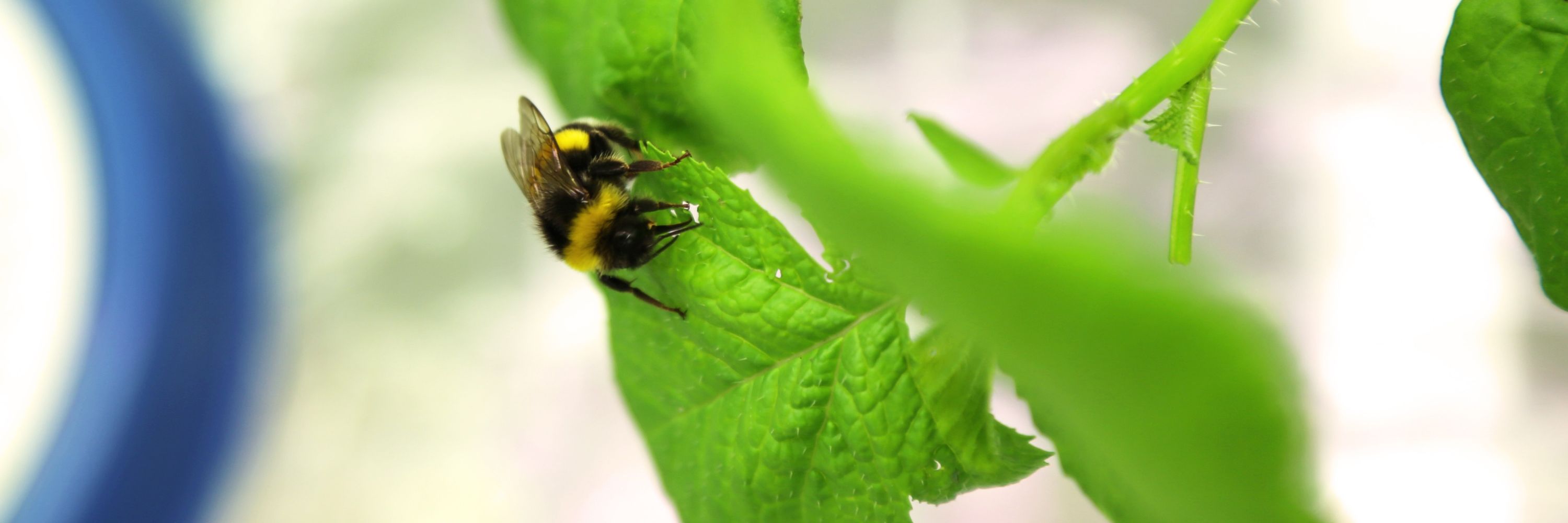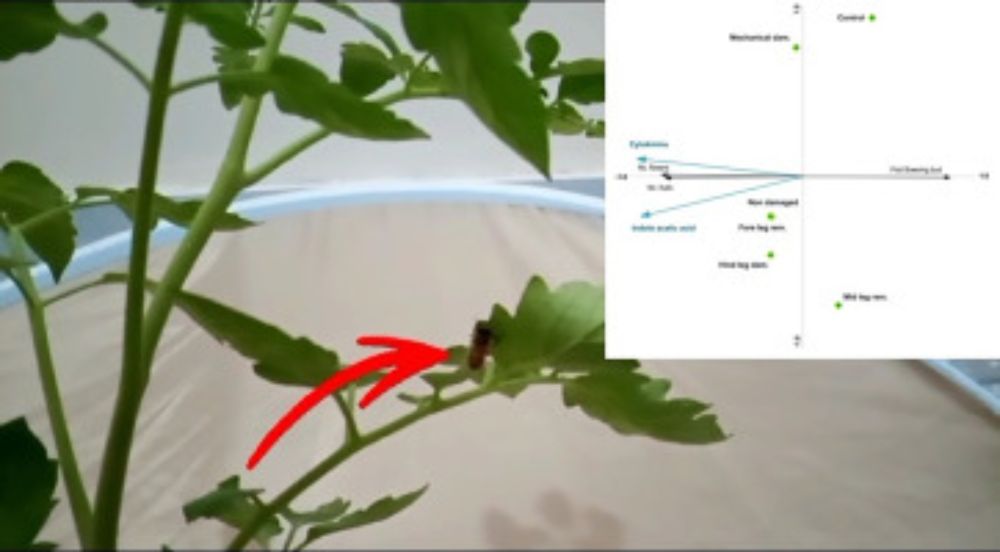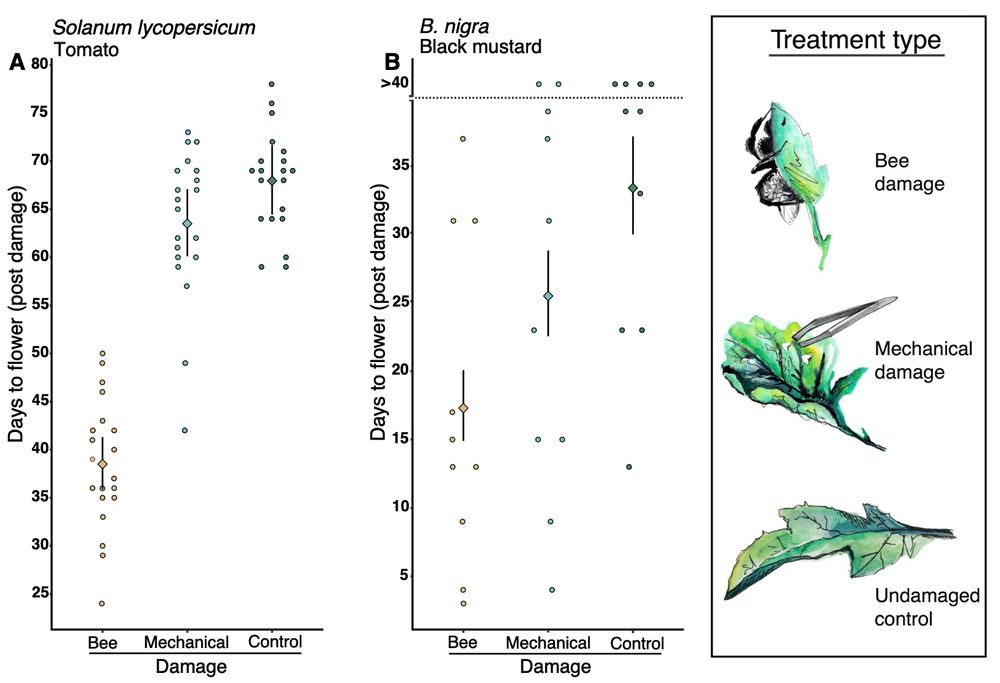
Evolution | Ecology | Bumblebees
Lecturer in #BehaviouralEcology at Wageningen University and Research
@hcs_lambert on Twitter

@usyseth.bsky.social.
Thanks for reading & follow for updates coming soon!
Research group: biocommunication.ethz.ch
Paper link: www.science.org/doi/10.1126/...

@usyseth.bsky.social.
Thanks for reading & follow for updates coming soon!
Research group: biocommunication.ethz.ch
Paper link: www.science.org/doi/10.1126/...
Thanks for the great perspective by @larschittka.bsky.social
science.sciencemag.org/content/368/...

Thanks for the great perspective by @larschittka.bsky.social
science.sciencemag.org/content/368/...
#PhenologicalMismatch

#PhenologicalMismatch

For two years, we repeated semi-natural experiments on roofs at @ethzurich.bsky.social. We found that bumble bee colonies always made more damage when flowers were limited.
![Fig. 4 Daily measurements of damage (total number of new leaf holes) by B. terrestris workers in two outdoor experiments.
(A) 2018 experiment with queenless microcolonies. In phase 1, only flowerless plants were present locally. In phase 2, 100 plants in flower were placed adjacent to the focal patch of flowerless plants. Colors indicate individual bee colonies. Damage by bees was significantly higher in phase 1 [generalized linear mixed model fit by maximum likelihood, term = phase, df = 1, F = 712.70, P < 0.001, Akaike information criterion (AIC) 1660.9]. Dots indicate days on which weather prevented data collection. The black line represents a 7-day centered moving average of new bee holes per day. Six flowerless plant species, 36 flowerless plants per bee colony, and five bee colonies (180 flowerless plants in total). (B) 2019 experiment with queenright colonies. Colonies in both treatments were placed adjacent to focal patches of flowerless plants. Colonies in the flowering treatment also had access to 30 plants in flower, placed adjacent to the focal patch, as well as a rooftop garden planted with wildflowers. On 2 days, indicated by triangles, all colonies were given access to sugar solution for 24 hours to mitigate effects of adverse weather conditions. Damage by bees was significantly higher in the flowerless treatment (GLM fit by maximum likelihood, term = treatment, df = 1, F = 5217.7, P < 0.001, AIC 2049.3). Damage levels on roof 2 increased significantly in the month after the wildflower garden was mown (df = 30, P ≤ 0.001, AIC 2960.4, GLM). Seven flowerless plant species, 600 flowerless plants per treatment, and eight bee colonies per treatment.](https://cdn.bsky.app/img/feed_thumbnail/plain/did:plc:etmgbynwifce3j4pr2awbduc/bafkreif7sgnb6l6syvcblxmt2lksonlpwgmdaol2diyzsi24pf2gl6y2oe@jpeg)
For two years, we repeated semi-natural experiments on roofs at @ethzurich.bsky.social. We found that bumble bee colonies always made more damage when flowers were limited.
Result? Hungry bees consistently made more damage.
![Fig. 3 Leaf damage by pollen-satiated and pollen-deprived bumble bees.
(A) Experimental setup: Two colonies were used in parallel for each trial, one of which was initially “pollen satiated” (PS) and then switched to “pollen deprived” (PD), while the other experienced the same treatments in the reverse order. Asterisks indicate days (1 and 8) when hives were weighed and new diet treatments were implemented. Adjustment (“A”) periods (days 2 to 4 and days 9 to 11) allowed colonies to acclimate to treatments. (B) Bees from pollen-deprived colonies inflicted higher levels of damage on plant leaves [F value (F) = 258, df = 32, R2 = 0.8801, P < 0.001, GLM], regardless of the order of the treatment. Additionally, the observed effects did not differ significantly among colonies (F = 258, df = 32, P = 0.732, GLM). Boxes represent the first to third quartile of the interquartile range, horizontal lines within boxes are medians, and the whiskers are the minimum and maximum values. Six hives, three replicates, and 72 plants. ***P ≤ 0.001; ns, not significant.](https://cdn.bsky.app/img/feed_thumbnail/plain/did:plc:etmgbynwifce3j4pr2awbduc/bafkreiffiz2ncxqkayj4nkoeibcfv6ajjasum3pudvwemgncayv63gi6ru@jpeg)
Result? Hungry bees consistently made more damage.
We started devising experiments to test whether multiple colonies would damage leaves in predictable ways.

We started devising experiments to test whether multiple colonies would damage leaves in predictable ways.

Even with a small number of holes, plants consistently flowered earlier compared to mechanical or undamaged controls.

Even with a small number of holes, plants consistently flowered earlier compared to mechanical or undamaged controls.
Why were they doing this?
Photo credit: bit.ly/hannier_pulido

Why were they doing this?
Photo credit: bit.ly/hannier_pulido

What if bumble bees could play an active role in shaping their environment? 🌏
What if bumble bees could play an active role in shaping their environment? 🌏

However, scientists observe increasing ‘hunger gaps’ owing to habitat modification and loss.
@TomTimberlake92 on X

However, scientists observe increasing ‘hunger gaps’ owing to habitat modification and loss.
@TomTimberlake92 on X
See Bumblebees: their behaviour and ecology by
@davegoulson.bsky.social

See Bumblebees: their behaviour and ecology by
@davegoulson.bsky.social
Unlike honey bees, bumble bee colonies are seasonal. In autumn, the colony dies off, leaving only the young, mated queens to hibernate. Come spring, these queens awaken to start new nests and the cycle begins anew.

Unlike honey bees, bumble bee colonies are seasonal. In autumn, the colony dies off, leaving only the young, mated queens to hibernate. Come spring, these queens awaken to start new nests and the cycle begins anew.

